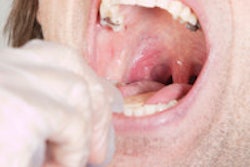Dear Oral Cancer & Diagnostics Insider,
The rate of oral cavity cancers has declined in recent years in most parts of the world, consistent with lower tobacco use. However, the rate of oropharyngeal cancer significantly increased among women and men from 1983 to 2002, almost exclusively in economically developed countries. Read what National Cancer Institute researchers say is behind the changes in this latest Insider Exclusive.
In other Oral Cancer & Diagnostics Community news, oral cancer screening by dental professionals is seen as crucial for early diagnosis of this growing phenomenon. But the U.S. Preventive Services Task Force's recent recommendation about whether it should be done by primary care physicians surprised some in the oral health community. Read more here.
And Navidea Biopharmaceuticals' Lymphoseek (technetium-99m tilmanocept), developed for sentinel lymph node detection in head and neck cancer, got fast-track designation from the U.S. Food and Drug Administration. Click here to find out how it could reduce the need for extensive lymph node dissection.
Meanwhile, Canadian researchers have identified a protein that can help predict whether a patient will develop oral cancer. Read about the predictive biomarker for dysplastic, premalignant oral lesions in a recent study in the International Journal of Cancer.
Also, a plant used in Indian and Chinese cooking and as a folk remedy for treating diabetes also shows therapeutic potential to treat head and neck squamous cell carcinoma. Read about the extract, which is already used to keep breast cancer cells from growing and spreading.
In other clinical research news, the incidence of oropharyngeal squamous cell carcinoma (OPSCC) is growing, and the human papillomavirus (HPV) is linked to an increasing number of such cases. Click here to read which kinds of therapy seems best for HPV-positive patients in this recent study in Cancer Treatment Reviews.
In a related story, most patients with OPSCC and HPV are largely unaware of a possible link between the two conditions. Read what Texas researchers say would help these patients in this new study in Oral Oncology.
Finally, many patients with head and neck cancers are malnourished when they are diagnosed, according to a recent study in the Journal of Oral and Maxillofacial Surgery. Click here to read how lack of appetite caused by obstruction of a patient's tumor and loss of muscle mass and fat stores are associated with the cancer.



















